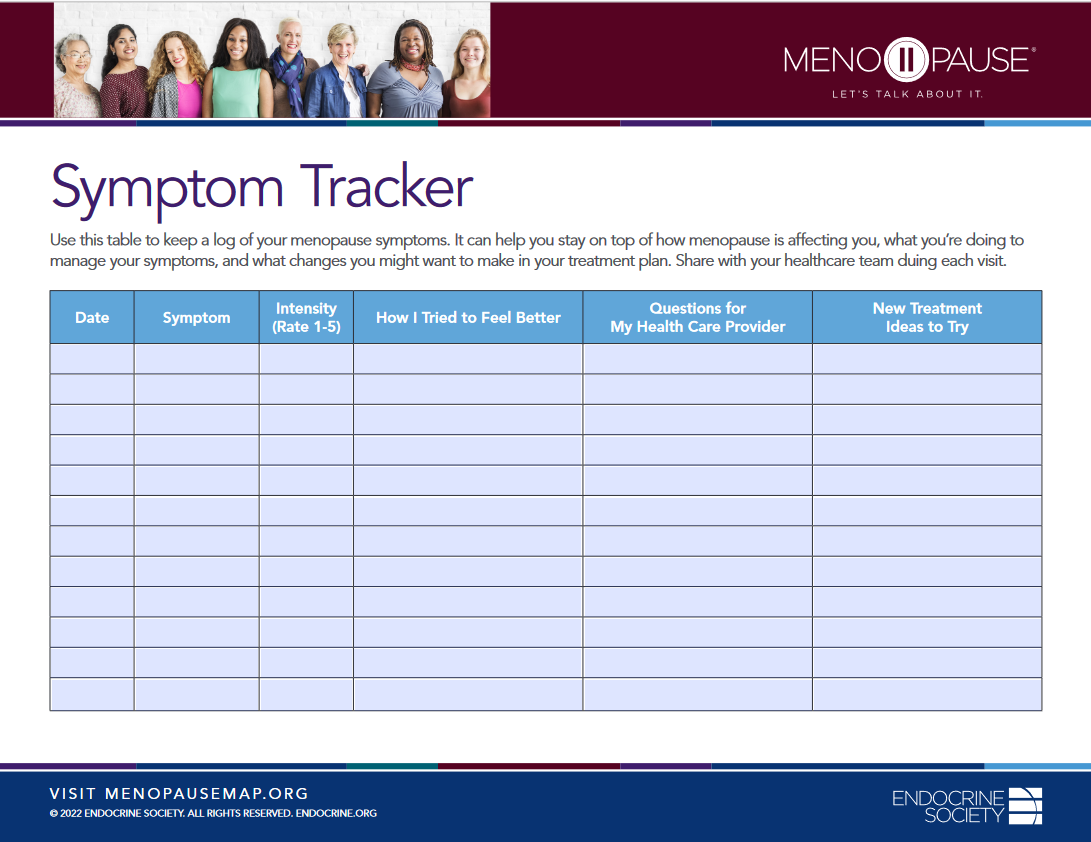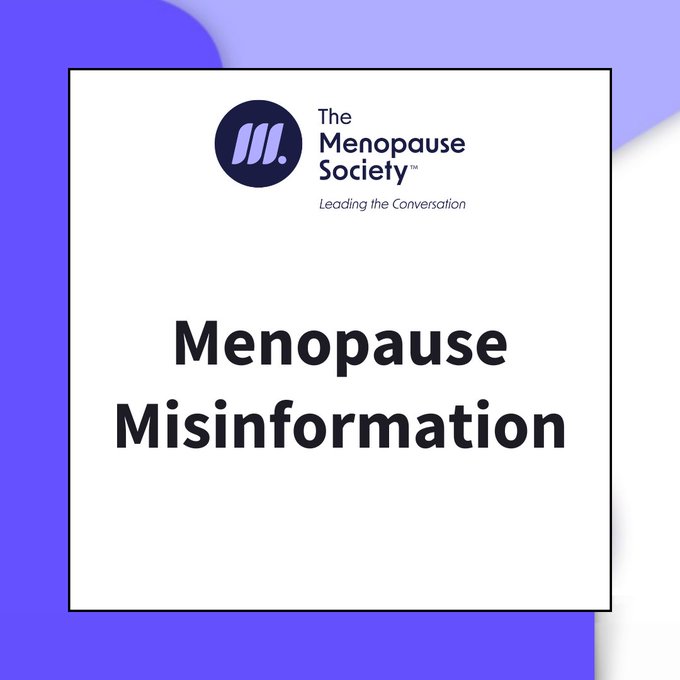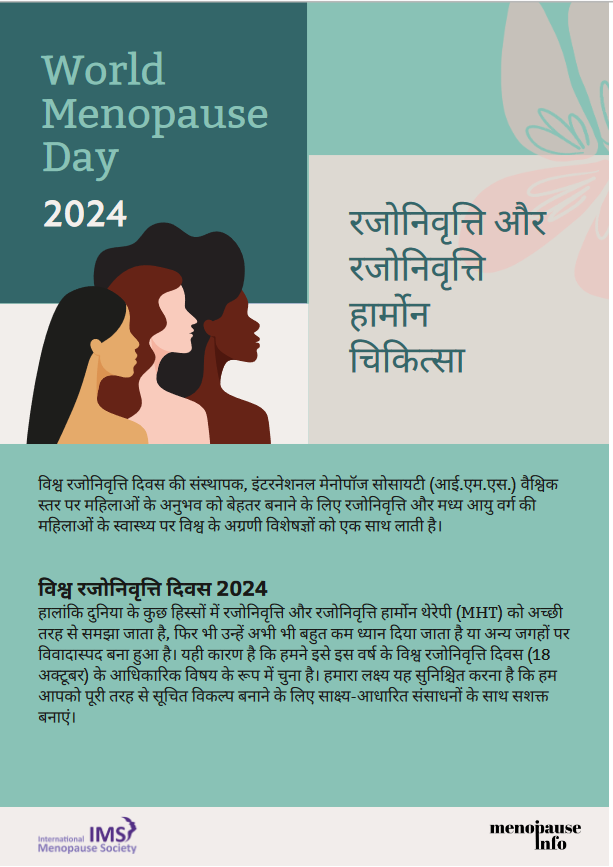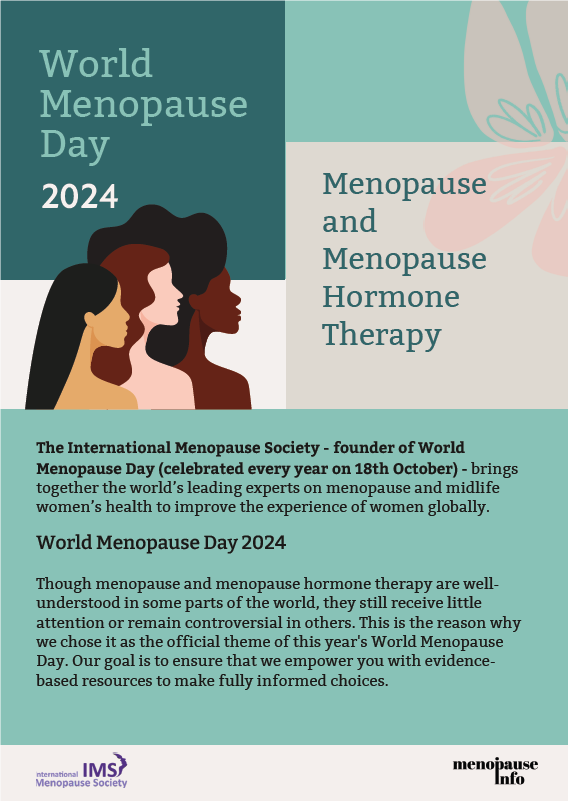“Although not proven by studies, slowly decreasing your
dose of estrogen over several months or even over several
years may reduce the chance that your hot flashes…”.1
Umbrella
What may the Hormone Therapy and Stopping Umbrella include?
Depending on the Source (DotS) this Umbrella may include:
- Hormone Replacement Therapy (HRT)
- Hormone Therapy (HT)
- Menopausal Hormone Therapy (MHT)
- Stopping Hormone Therapy
Right Time
Is there a right time to stop HT?
In Hormone Therapy: Stopping Hormone Therapy the (United States) Menopause Society (formerly The North American Menopause Society) explain:
On page five in Menopause and Menopause Hormone Therapy: 3. When Should MHT Be Started or Stopped? When To Stop? the International Menopause Society’s (IMS) Leaflet for Women for World Menopause Day 2024, the IMS explain:
- “There is no set rule for when to stop MHT. Some women use it for only a few years, while others may need it longer
- It’s important to regularly check with your healthcare professional to see if continuing MHT is the right choice for you”.3
Right Age
Is there a right age to stop HT?
On page two in the The North American Menopause Society Releases Its 2022 Hormone Therapy Position Statement published 07 July 2022, the North American Menopause Society note:

- “Hormone therapy does not need to be routinely discontinued in women aged older than 60 or 65 years and can be considered for continuation beyond age 65 for persistent VMS, quality-of-life issues, or prevention of osteoporosis after appropriate evaluation and counseling of benefits and risks
- For women with GSM, vaginal estrogen (and systemic if required) or other nonestrogen therapies may be used at any age and for extended duration, if needed”.4
What is VMS?
VMS can be an abbreviation for Vasomotor Symptoms such as hot flushes or night sweats.
What is GSM?
GSM can be an abbreviation for Genitourinary Syndrome of Menopause.
On page two in the Joint Position Statement By the British Menopause Society, Royal College of Obstetricians and Gynaecologists and Society for Endocrinology on Best Practice Recommendations for the Care of Women Experiencing the Menopause first published online 10 June 2022, one of the recommendations is:
- “The decision whether to take HRT, the dose and duration of its use should be made on an individualised basis after discussing the benefits and risks with each patient. This should be considered in the context of the overall benefits obtained from using HRT including symptom control and improving quality of life as well as considering the bone and cardiovascular benefits associated with HRT use. Discussions with women should also cover aspects such as when to consider stopping HRT and how this can be done (by gradually reducing the dose of HRT). No arbitrary limits should be set on age or duration of HRT intake”.5
Age 65
Is stopping HT routinely at the age of 65 recommended?
No. In Starting and Stopping Hormone Therapy: Risks and Benefits the European Menopause and Andropause Society (EMAS) explain:
The IMS note:
Right Way
Is there a right way to stop HT?
In Starting and Stopping Hormone Therapy: Stopping MHT the EMAS note:
- “There appears to be no advantage in tapering down or in stopping abruptly”.8
The Menopause Society explain:
In Hormone Replacement Therapy (HRT): When To Take Hormone Replacement Therapy (HRT) – Stopping HRT the (United Kingdom) NHS note:
If you’re over 50 years old and are taking HRT to relieve menopause symptoms, a GP might suggest that you try stopping every 2 to 3 years, to see if you still need it or if your symptoms have improved.
If your menopause symptoms return when you try stopping, and you decide that the benefits of HRT for your symptoms still outweigh the risks, you can keep taking HRT for longer”.10
Who is a GP?
DotS and DotC (Depending on the Country) a GP may be a qualified and registered general practitioner, a medical practitioner, a medical doctor or a doctor.
Health Care Provider
What if I unsure about when and how to stop HT?
If you are unsure about when and how to stop HT, it may be in your best interest to choose to talk to your health care provider about this. The Menopause Society explain:
Health Topics A-Z
Where may I find Health Topics A-Z related to Hormone Therapy and Stopping?
In Health Topics A-Z you may find:
Links
Where may I find Links related to Hormone Therapy and Stopping?
Your Country may have Links similar to:
Links
This Links List to third party websites is neither comprehensive nor exhaustive. Inclusion on this Links List does not imply endorsement or recommendation. Non-inclusion on this Links List does not imply non-endorsement or non-recommendation. Third party websites are not under the control of Meno Martha International Menopause Directory. Third party websites may contain explicit medical images and/or sexual references. Please read Meno Martha International Menopause Directory’s Links Policy before proceeding to a Link. Please contact Webmaster if you experience a problem with a Link.New or Updated
- Askearlymenopause.org [Ask EM] [+ Video: What Is Early Menopause?]
- BMS TV: Testosterone Explained
- Cognitive Behaviour Therapy (CBT) for Menopausal Symptoms
- Consumer Video and Podcast Series: 2023 Consumer Videos and Podcasts – NAMS 2023 Nonhormone Therapies Position Statement for Bothersome Menopause Symptoms
- Consumer Video and Podcast Series: 2023 Consumer Videos and Podcasts – New FDA-Approved Nonhormone Option for the Treatment of Hot Flashes
- Consumer Video and Podcast Series: 2024 Consumer Videos and Podcasts – Preparing for Your Menopause Health Care Visit
- Deciding About Hormone Therapy
- Deciding About Hormone Therapy Use
- EMAS On-Demand Webinars [European Menopause and Andropause Society] [Multiply Languages]: Impact of Estrogen Deficiency on Quality of Life In Asia and the Role of Continuous Combined MHT In Treatment (EN)
- Find A Menopause Practitioner [United States and Other]
- Find A Practitioner [Australasian Menopause Society i.e. Australia and New Zealand]
- Find Your Nearest BMS Menopause Specialist [British Menopause Society]
- Genitourinary Syndrome of Menopause
- Genitourinary Syndrome of Menopause
- HRT Questions Answered
- HRT: Benefits and Risks
- HRT: Types, Doses and Regimens
- Hormone Replacement Therapy (HRT)
- Hormone Replacement Therapy (HRT): Benefits and Risks of Hormone Replacement Therapy (HRT)
- Hormone Replacement Therapy (HRT): Vaginal Oestrogen
- Hormone Replacement Therapy (HRT): When To Take Hormone Replacement Therapy (HRT)
- Hormone Therapy
- Hormone Therapy: Is It Right for You?
- Hot Flashes
- Hot Flashes
- How Should You Come Off Your HRT?
- Is It Ever Too Late To Start HRT?
- Is It Too Late To Start HRT?
- Joint Position Statement By the British Menopause Society, Royal College of Obstetricians and Gynaecologists and Society for Endocrinology on Best Practice Recommendations for the Care of Women Experiencing the Menopause
- Later Years (Around 50 Years and Over): Menopause and Post Menopause Health – Hormone Replacement Therapy (HRT) [+ Video: Is HRT Bad for You?]
- Mayo Clinic Minute: Help With Hot Flashes Due To Menopause [+ Video Courtesy: Mayo Clinic News Network]
- Menopause
- Menopause
- Menopause Map: Downloadable Resources – My Personal Path Print Tools: Questions for Your Health Care Provider

- Menopause Map: Downloadable Resources – My Personal Path Print Tools: Symptom Tracker

- Menopause Symptoms: Mayo Clinic Expert Outlines Hormone and Nonhormonal Therapies
- Menopause Treatments: What Works, What Doesn’t
- Menopause and HRT: Fact and Fiction
- Menopause: Identification and Management [NICE Guideline Published: 12 November 2015 Last Updated: 07 November 2024]

- Menopause: Identification and Management: NICE Guideline [NG23] [07 November 2024]
- Ongoing Individualized Hormone Therapy Appears To Have No Age Limit
- Practical HRT Tips | Dr Louise Newson
- The 2023 Practitioner’s Toolkit for Managing Menopause
- The Menopause Society Statement on Misinformation Surrounding Hormone Therapy

- The North American Menopause Society Releases Its 2022 Hormone Therapy Position Statement
- Types of Hormone Therapy
- Updated 2024 NICE Menopause Guidance Summary [08 November 2024]
- Video & Podcast Library: Videos – World Menopause Day 2024: Menopause and Hormone Therapy: Current Perspectives and Controversies
- Videos & Podcasts: Videos – Menopause and Hormone Therapy: Current Perspectives and Controversies
- Webinars: Non-Hormonal Pharmacological Interventions For VMS
- Webinars: Non-Pharmacological Interventions For VMS
- What Are the Benefits and Risks of HRT?
- What Does Estrogen Do?
- What Types of Vaginal Oestrogens Are There?
- World Menopause Day 2024: Leaflet for Women – Menopause and Menopause Hormone Therapy [Multiply Languages]
 World Menopause Day 2024: Poster for Women – The 5 Ws of Menopause Hormone Therapy (MHT)
World Menopause Day 2024: Poster for Women – The 5 Ws of Menopause Hormone Therapy (MHT)
Sources
Where may I find the Sources quoted?
You may find the Sources quoted at:
Sources
- Hormone Therapy: Stopping Hormone Therapy. Menopause Society https://menopause.org/patient-education/menopause-topics/hormone-therapy Accessed: 23 August 2025
- Hormone Therapy: Stopping Hormone Therapy. Menopause Society https://menopause.org/patient-education/menopause-topics/hormone-therapy Accessed: 23 August 2025
- Menopause and Menopause Hormone Therapy: When Should MHT Be Started or Stopped? When To Stop? October 2024:4. International Menopause Society https://www.imsociety.org/wp-content/uploads/2024/10/2024-WMD-Leaflet_English.pdf?v=8bcc25c96aa5 Accessed: 23 August 2025
- The North American Menopause Society Releases Its 2022 Hormone Therapy Position Statement. 07 July 2022:2. North American Menopause Society https://menopause.org/wp-content/uploads/press-release/ht-position-statement-release.pdf Accessed: 23 August 2025
- Hamoda, H., Mukherjee, A., Morris, E., Baldeweg, S. E., Jayesena, C. N., Briggs, P., Moger, S. Joint Position Statement By the British Menopause Society, Royal College of Obstetricians and Gynaecologists and Society for Endocrinology on Best Practice Recommendations for the Care of Women Experiencing the Menopause. First Published Online 10 June 2022 https://journals.sagepub.com/doi/full/10.1177/20533691221104879 Accessed: 23 August 2025
- Starting and Stopping Hormone Therapy: Stopping MHT. 2022. European Menopause and Andropause Society https://emas-online.org/wp-content/uploads/2022/05/Starting-and-stopping-hormone-therapy.pdf Accessed: 23 August 2025
- Menopause and Menopause Hormone Therapy: When Should MHT Be Started and Stopped? Long-Term Use. October 2024:6. International Menopause Society https://www.imsociety.org/wp-content/uploads/2024/10/2024-WMD-Leaflet_English.pdf?v=8bcc25c96aa5 Accessed: 23 August 2025
- Starting and Stopping Hormone Therapy: Risks and Benefits. 2022. European Menopause and Andropause Society https://emas-online.org/wp-content/uploads/2022/05/Starting-and-stopping-hormone-therapy.pdf Accessed: 23 August 2025
- Hormone Therapy: Stopping Hormone Therapy. Menopause Society https://menopause.org/patient-education/menopause-topics/hormone-therapy Accessed: 23 August 2025
- Hormone Replacement Therapy (HRT): When To Take Hormone Replacement Therapy (HRT) – Stopping HRT. Page Last Reviewed: 04 January 2023. NHS https://www.nhs.uk/medicines/hormone-replacement-therapy-hrt/when-to-take-hormone-replacement-therapy-hrt/ Accessed: 23 August 2025
- Hormone Therapy: Stopping Hormone Therapy. Menopause Society https://menopause.org/patient-education/menopause-topics/hormone-therapy Accessed: 23 August 2025








